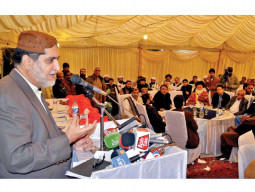
While disposing of her petition, Justice Athar Minallah of the IHC ordered the secretary to hear Mazari’s arguments and decide the matter before the national census starts next week on March 15.
Thereafter, Justice Minallah converted the petition into a representation and issued directions to the statistics division secretary.
Mazari had approached the court urging it to direct the respondents to use a form, through which information regarding the specially abled is collected, including questions on the number of people in each house and the nature of their disability.
Army to crosscheck census data for transparency
The motivational speaker, through her counsel Hasan Murtaza Mann and Sajeel Sheryar, had made the federal government through the secretary statistics division and the Chief Statistician, Chief Census Commissioner of the Pakistan Bureau of Statistics respondents in the case.
Mazari is an artist, a writer and a motivational speaker and Pakistan’s first National United Nations Women Ambassador. At the age of 21, Mazari was bound to a wheelchair after suffering a spinal cord injury in a car accident.
In the petition, Mann said that people with disabilities are one of the most neglected, marginalised and unrepresented groups in Pakistan. He added that these people face a multitude of social, economic, physical and political barriers which hamper their efforts to live a normal life.
Due to the unreliability and paucity of official data on these people, he contended that different international and national non-governmental and semi-government organisations, including the World Health Organisation, had conducted surveys which disclose that in Pakistan, the prevalence of disability was 13.4 per cent with 9.6 years of full health lost to disability per 100 people in 2004.
Census in Lahore begins on 15th
Mann submitted that reliable data in this regard was crucial for devising and implementing concrete and effective laws and policies for this segment of Pakistan’s population.
For the upcoming census, he argued, the government was using a form which does not contain any questionnaire to ascertain the number of people with disabilities and the nature of their disabilities. Subsequently, he argued, the respondents were denying the very existence of the petitioner and other citizens with disabilities by not recording data about them.
National Population Census, beginning on March 15 with a house listing operation, is one of the most credible sources of information on population characteristics whereby information on the country’s demographic, social and economic is collected.
A reliable census is vital for any nation hoping to adequately plan and deliver services to solve the country’s problems.
Unfortunately, he contended, even with 200,000 army personnel and 91,000 civilian enumerators at its disposal, the exercise, which will cost the exchequer over Rs14 billion, is likely to be seriously flawed.
In fact, he said, if it is allowed to proceed in the way that the respondents have designed it, this “exercise would be looked upon as the biggest disservice to the nation.”
He urged the court to issue directions to ensure that respondents collect necessary information about specially abled people and ensure proper identification of such people, documentation of their impairments and categorisations of the type, cause, duration and severity of the disability.
Published in The Express Tribune, March 11th, 2017.










































COMMENTS
Comments are moderated and generally will be posted if they are on-topic and not abusive.
For more information, please see our Comments FAQ